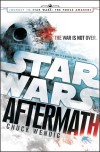Sos the Rope
 I make it a habit not to be ashamed of the stuff I read. For me, the ultimate goal is the story, which is why I can still appreciate authors like Dan Brown, Douglas Preston and Lincoln Child, or Steve Alten. So I’m not embarrassed to say that I re-read a Piers Anthony book. When I was younger, I devoured his books, but now, as an adult, I find him to be a little too juvenile for my tastes. But I also turned forty this year, and I expect that the nostalgia kicked in and inspired me to pick up Sos the Rope when I saw it on sale at a local store.
I make it a habit not to be ashamed of the stuff I read. For me, the ultimate goal is the story, which is why I can still appreciate authors like Dan Brown, Douglas Preston and Lincoln Child, or Steve Alten. So I’m not embarrassed to say that I re-read a Piers Anthony book. When I was younger, I devoured his books, but now, as an adult, I find him to be a little too juvenile for my tastes. But I also turned forty this year, and I expect that the nostalgia kicked in and inspired me to pick up Sos the Rope when I saw it on sale at a local store.There’s a lengthy appreciation of this book as a foreword to the story by Robert Vardeman, and the author puts the book into perspective on its place in the history of science fiction. At the time of its publication in 1968, the old wave of science fiction — where burly adventurers went out and did manly things in the setting of the future — was slowly transitioning over to the new wave of science fiction, where the adventurers were more flawed and prone to introspection and examination. He mentions that Sos the Rope is a merging of those two waves, and it helped to have that in mind when I went to re-read the novel. I had been in high school the first time I read the book, and not only did I not have a clue where the book fell in the history of science fiction, but I also didn’t realize that Piers Anthony didn’t write his women characters to be very independent.
I can read other classic science fiction novels from the 1950s and earlier and overlook the role the women play in those books, but I think I was expecting something different from a book originally published in 1968. There are two primary female characters in the story, and while they’re strong women who aren’t afraid to speak their mind, they’re still just there to take care of the men. Shoot, in the world of the novel, the women are nameless until they enter into a relationship with a man, and then they take on a variation of his name. If they end their relationship, the woman goes back to being nameless until she finds another man.
The novel is still compelling and interesting, and I think that owes much to the way that Anthony creates his characters. The story is essentially driven by Sos’ sense of honor and his position after losing his own name in battle. He’s in love with a woman who belongs to the man who took his name, but the conditions of him losing the battle disallow him from taking up any of the standard weapons of the realm, and his lowly position prevents him from being able to fight for the woman he loves. Ultimately, he is banished from the society and sent to the mountain, which he climbs with the intent of dying on his journey, but he later returns, enhanced and nearly invulnerable, to break apart the empire that he helped create with the man who took his name. So the nameless issue with the women characters sort of comes full circle, and now I wonder if Anthony was attempting to make some commentary on the women’s lib movement through that whole development. But when you look at Anthony’s entire spectrum of work, you find that he never really develops his women characters outside of how they affect his male protagonists, even though they wind up being strong characters otherwise.
Despite all that, I’m still interested in reading the rest of the series. I remember bits and pieces of the overall story, but I don’t remember the specifics of how the primary conflict between the primitives and the “crazies” works out. I guess I could look online to get a summary of the details, but part of me wants to see if the themes improve over the next two novels.






